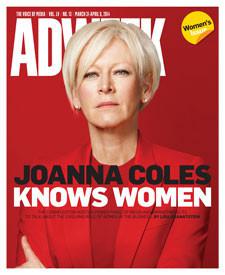The new issue of Adweek, the “women’s issue,” features a super fierce photo of Cosmopolitan editor Joanna Coles on its cover and touts a “candid conversation” with Coles and four other female leaders in media and advertising inside. Adweek’s Lisa Granatstein promises that the conversation with Coles, Morning Joe co-host Mika Brzezinski, digital marking CEO Sarah Hofstetter, and advertising execs Nadja Bellan-White and Nancy Reyes will “shed some light on the state of women” in media.
Unfortunately, I read the whole thing and learned almost nothing about anything, and definitely nothing about the unique struggles of women in media. Everyone agrees that things need to change to get more women in leadership roles, blah blah blah, but no one offers any suggestions on how to do that, other than to be an “equal opportunity manager” when it comes to men and women needing time for their out-of-office lives, and to tell women not to quit their jobs when they have kids if they want to be CEO. Oh, and there’s the standard “love what you do,” “listen to your heart,” and “don’t forget to get married and have kids if that’s something you want” advice.
Here’s Brzezinski, who said that in the TV news business, the problem isn’t that women aren’t being given a shot; it’s that they’re being promoted too early because of their looks:
I think there’s kind of an inherent problem, which is somewhat sexist, although it is not overtly sexist, it’s something that happens almost subconsciously. And that is, a lot of young women are hired into television when they’re not ready, because other aspects of their … you know, what they bring to the table, [they] really shine brightly. And a lot of male executives will … and female, will say well that … you know, pretty or poppy or she’s got this. And it’s not the talent—she doesn’t have what backs it up. And I actually remember in my career being pushed up too soon and paying for it several times to the point where, by the time I was offered a really, really big possibility of a promotion at CBS, I said, “We ought to wait a year, because I’m going to get killed.” And I did wait a year—and I still got killed.
I’ve read pretty much every article like this one that’s been printed over the last six-plus years because I write about this stuff for a living, but Brzezinski’s “advice” finally made something click for me: that giving “women” generalized career advice is useless and possibly damaging. Brzezinski’s thoughts are applicable to women who want to be on-air TV news personalities and pretty much no one else. People of both sexes are better off listening to advice from peers in their own fields, because standards and experiences are so wildly different depending on what you do. There is no such thing as “women in the workplace.” There are women in hospitals, women in law firms, women in TV news, women in magazines, women in the restaurant business, women at Walmart.
The same applies to salary negotiations. The New York Times published a guide telling women how to negotiate for a raise in March, which Slate’s Amanda Hess smartly dismantled. Hess’ point is that women don’t need advice on how to get a raise; employers need advice on how to be less sexist. My problem with the Times piece is that some of the tips were actually really bad advice, at least when it comes to my field, journalism. Maybe in some professions it’s seen as “aggressive” when women get outside offers and use them to get a raise from their bosses, as the Times posits. But in journalism—where jobs are scarce, profit margins are slim, and benchmarks of success can be fairly arbitrary—nearly every raise or promotion I’ve ever heard of people getting was because they got outside offers and their current employer countered. Meaning, if I want advice on how to negotiate a better salary, I’m much better off talking to a bunch of journalists—male and female—than seeking the counsel of a Woman in Leadership.
I get why magazines keep publishing pieces like this Adweek round table. Ambitious young women are clearly hungry for blueprints on how to succeed at a game that can feel rigged. But if you need a famous woman to tell you to listen to your heart, you have bigger problems than figuring out how to climb that corporate ladder.
